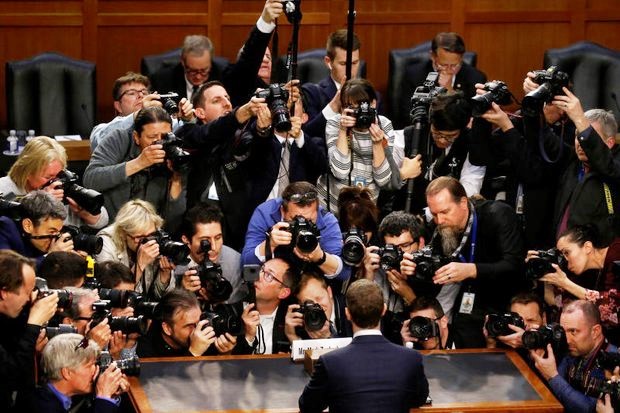
WASHINGTON: Facebook CEO Mark Zuckerberg says the company is "responsible for the content" on its platform.
That's a departure from how internet companies have traditionally viewed themselves - as neutral platforms generally not responsible for what people post and share on their services.
But Zuckerberg, who is testifying before a rare joint congressional committee on Tuesday, says Facebook needs to take a "broader view" of its responsibility in the world.
He also says that advances in artificial intelligence mean companies like Facebook will have to think about proactively removing objectionable content, for example, not just reactively after someone flags it. This, he says, raises "moral and legal" obligation questions.
Facebook already removes some content, such as suspected terrorist propaganda before anyone sees it. But as its systems improve, it'll likely be able to remove other content too.
Zuckerberg began a two-day congressional inquisition with a public apology for the privacy scandal that has shaken the social media giant he founded more than a decade ago. He took responsibility for failing to prevent Cambridge Analytica, a firm affiliated with Donald Trump's presidential campaign, from gathering personal information from 87 million users to try to influence elections.
Zuckerberg had apologised many times already, to users and the public, but this was the first time in his career that he had gone before Congress. He also is to testify Wednesday before the House Energy and Commerce Committee.
Republican Senator John Thune of South Dakota, the Commerce Committee chairman, told Zuckerberg his company has a 14-year history of apologising for "ill-advised decisions" related to user privacy. "How is today's apology different" Thune asked.
"We have made a lot of mistakes in running the company," Zuckerberg responded. "I think it's pretty much impossible, I believe, to start a company in your dorm room and then grow it to be at the scale that we're at now without making some mistakes."
Zuckerberg said Facebook is going through "a broader philosophical shift in how we approach our responsibility as a company." He said the company needs to take a "more proactive role" that includes ensuring the tools it creates are used in "good and healthy" ways.
In the hearings, Zuckerberg is not only trying to restore public trust in his company but also to stave off federal regulations that some lawmakers have floated. In his opening statement, he also apologised for his company's involvement in facilitating fake news and Russian interference in the elections.
"We didn't take a broad enough view of our responsibility, and that was a big mistake," he said. "It was my mistake, and I'm sorry. I started Facebook, I run it, and I'm responsible for what happens here."
Separately, the company also began alerting some of its users that their data was gathered by Cambridge Analytica. A notification that appeared on Facebook for some users Tuesday told them that "one of your friends" used Facebook to log into a now-banned personality quiz app called "This Is Your Digital Life." The notice says the app misused the information, including public profiles, page likes, birthdays and current cities, by sharing it with Cambridge Analytica.
After resisting previous calls to testify, Zuckerberg agreed to come to Capitol Hill this month after reports surfaced - and the company confirmed - that Cambridge Analytica had gathered Facebook users' data. Zuckerberg said his company has a responsibility to make sure that doesn't happen again.